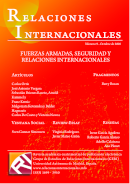"Introduction" and "Chapter 10" in People, States & Fear: An Agenda for International Security Studies in the post-Cold War Era, ECPR Press Classic Series, no.2, Colchester, Essex, United Kingdom, 2007
Keywords:
national security, state, peopleCopyright (c) 2008 Barry BUZAN

This work is licensed under a Creative Commons Attribution-NonCommercial-NoDerivatives 4.0 International License.
Abstract
In order to have a proper understanding of the national security problem one must ? rst understand the concept of security. In much of its prevailing usage, especially by those associated with state policy-making, this concept is so weakly developed as to be inadequate for the task. I seek to demonstrate that a simple-minded concept of security constitutes such a substantial barrier to progress that it might almost be counted as part of the problem. By simple-minded I mean an understanding of national security that is inadequately aware of the contradictions latent within the concept itself, and/or inadequately aware of the fact that the logic of security almost always involves high levels of interdependence among the actors trying to make themselves secure. I will try to show how a more developed and broader-based concept can lead to a constructive redefinition of the problem of national security.





